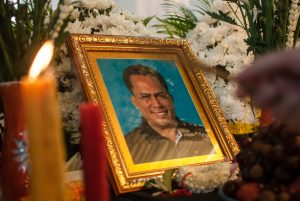Five years ago, on the morning of July 10, 2016, Dr. Kem Ley, a Cambodian political commentator and human rights defender, was shot and killed while drinking his morning coffee at a Caltex service station in the country’s capital, Phnom Penh. Each year since, human rights groups have issued statements decrying the killing and pointing out the numerous legal shortcomings of the spurious official investigation into the incident.
This week, which marks the fifth anniversary of Kem Ley’s death, has been no different, with domestic and international rights organizations calling on Cambodian authorities to create an independent commission of inquiry to investigate the activist’s death.
“To date, there has been no independent, impartial and effective investigation to establish whether anyone else was involved in the killing,” a group of 45 domestic and international rights groups said in a joint statement issued Friday.
Like many Cambodian opposition figures, Kem Ley combined calls for social justice and denunciations of official corruption with nationalist appeals focusing on the baleful influence of Vietnam, a message that he was planning to take to local elections in 2017, as the head of his recently created Grassroots Democracy Party. The murder took place just days after he publicly commented on a report by the London-based watchdog Global Witness, examining the immense wealth of Prime Minister Hun Sen and his family, and the “huge network of secret deal-making and nepotism” that sustains the rule of the Cambodian People’s Party (CPP).
In retrospect, Kem Ley’s killing can be said to have marked the beginning of a dramatic tightening of the political space in Cambodia, after the opposition Cambodia National Rescue Party (CNRP) came close to unseating the CPP at national elections in 2013. After driving CNRP President Sam Rainsy into exile in late 2016, a Cambodian court dissolved the CNRP in late 2017 and arrested its president Kem Sokha on charges of treason, amid a wider crackdown against civil society groups and the independent press. This left the CPP free to run nearly unopposed at the elections in July 2018, in which it clinched all 125 seats in the Cambodian parliament.
Like so many cases of political violence that have stained Cambodian politics over the past three decades, the government quickly initiated an investigation into Kem Ley’s killing – but one marred by a host of shortcomings. Authorities pinned the killing on Oeuth Ang, a former soldier, who was alleged to have murdered the activist over an unpaid $3,000 debt. He was sentenced to life in prison in March 2017, a verdict that was upheld in May of 2019.
However, many claim that even if Oeuth Ang pulled the trigger, as is likely, his story was suspect and that he was likely a scapegoat for a political killing ordered from the shadowy heights of the Cambodian security state.
Friday’s statement from the coalition of human rights groups reiterated the many problems with the investigation and trial of Oeuth Ang. These included the implausible claim that the killing was a result of an unpaid loan, the failure to interview a witness named by the accused to corroborate his story, and the production in court of video footage from only one of several CCTV cameras at the gas station that likely captured the event.
The statement also decried the failure of investigators to locate and interview the alleged seller of the murder weapon, their failure to examine the accused’s possible ties to the military, and their inability to account for the identity of individuals, one of them apparently armed, seen in video footage pursuing the accused as he fled the crime scene.
“No one believes for a second that scapegoat Oeuth Ang was anything more than a stooge set up to spout absurdities in court, and take the rap for a political killing,” Phil Robertson of the U.S.-based group Human Rights Watch said in an emailed statement. “The outlines of Cambodia’s current authoritarian dictatorship started with the blood of Kem Ley, and that’s why the country’s leaders and the ruling Cambodian People’s Party will ensure there will never be justice for Kem Ley in a Cambodian court.”
Five years on, the yearly calls for accountability for Kem Ley’s killing have begun to take on a ritualistic quality, given the CPP government’s clear lack of interest in reexamining the case. As long as Hun Sen remains in power, Kem Ley’s killing – and countless other episodes of political violence that have taken place since the 1990s – will no doubt remain shrouded in mystery.

































